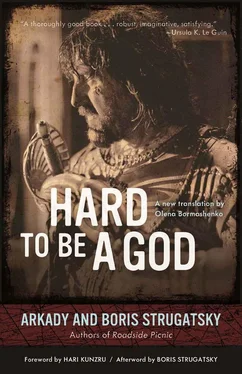The huge storm trooper stuck his finger in his mouth, sucked on it, then took it out and examined it carefully. The finger was covered in blood. The storm trooper caught Rumata’s eye and rasped affably, “Bit worse than a ferret, the bastard!”
The second storm trooper quickly snickered. A shrimpy, pale kid, uncertain-looking, with a pimply mug—it was immediately obvious that he was a rookie, a tadpole, a cub…
“What’s going on here?” Rumata inquired.
“Got a concealed bookworm,” the cub said nervously.
The giant started sucking on his finger again, without changing his attitude.
“At attention!” Rumata ordered quietly.
The cub quickly jumped up and picked up his ax. The giant thought about it but did put his foot down and stand up fairly straight.
“So who was the bookworm?” Rumata asked.
“I don’t know,” the cub said. “It was the order of Father Zupic.”
“Well, what happened? You took him?”
“That’s right! We took him!”
“That’s good,” said Rumata. That really wasn’t bad. There was still time. Nothing is more precious than time, he thought. An hour buys a life; a day is invaluable. “And what did you do with him? Stick him in the tower?”
“Huh?” the cub asked in confusion.
“I’m asking, is he now in the tower?”
The pimply mug spread into an uncertain grin. The giant roared with laughter. Rumata rapidly turned around. There, on the other side of the street, Father Hauk’s corpse hung like a sack of rags from the crossbeam of a gate. A few ragged urchins, mouths wide open, gawked at him from the yard.
“It isn’t everyone who gets sent to the tower nowadays,” the giant rasped out amiably behind him. “We do things quick nowadays. A knot by the ear—and off you go.”
The cub giggled again. Rumata glanced at him blindly, and slowly crossed the street. The sad poet’s face was black and unrecognizable. Rumata looked down. Only the hands were recognizable, with their long, weak fingers, stained with ink.
Nowadays we don’t pass away,
We’re led away into darkness.
And even if anyone dares to
Wish that it were otherwise,
Powerless and incompetent,
He lowers his weak hands,
Not knowing where the dragon’s heart is.
And whether the dragon has one.
Rumata turned around and walked away. My good, weak Hauk… The dragon does have a heart. And we know where it is. And that’s the most frightening thing, my quiet, helpless friend. We know where it is, but we can’t destroy it without spilling the blood of thousands of frightened, hypnotized, blind people who know no doubts. And there are so many of them, hopelessly many—ignorant, isolated, embittered by perpetual thankless labor, downtrodden, not yet able to rise above the thought of an extra penny. And they cannot yet be taught, united, guided, saved from themselves. Far too early, centuries earlier than it should have, the gray muck has risen in Arkanar. It won’t meet with resistance, and all that’s left is to save those few there is still time to save. Budach, Tarra, Nanin, maybe another dozen, maybe another two dozen.
But the very thought that thousands of others—maybe less talented but also honest and truly noble people—were fatally doomed caused an icy chill in his chest and an awareness of his own vileness. Sometimes this awareness became so acute that his mind would become clouded, and Rumata could almost see the backs of the gray bastards illuminated by lilac flashes of gunfire, and Don Reba’s eternally insignificant, pale visage contorted with animal terror, and the Merry Tower collapsing on itself. Yes, that’d be sweet. That would be actual work. An actual macroscopic impact. But then… Yes, they were right at the Institute. Then the inevitable. Bloody chaos in the country. The surfacing of Waga’s night army, ten thousand thugs excommunicated by every church—rapists, murderers, and sadists; hordes of copper-skinned barbarians descending from the mountains and destroying everything that moves, from newborns to the aged; huge crowds of peasants and townspeople, blind with terror, fleeing to the forests, mountains, and deserts; and your supporters—merry men, brave men!—ripping open each other’s bellies in a brutal struggle for power and for the right to control the machine gun after your inevitable violent death. And this absurd death—from a cup of wine served by your best friend, or from a crossbow bolt whistling toward your back from behind a curtain. And the horrified face of the one who will be sent from Earth to replace you, and who will find a country depopulated, drenched in blood, still burning, in which everything, everything, everything will need to be started over again.
When Rumata kicked open the door of his house and entered the magnificent, dilapidated entrance hall, he was as gloomy as a storm cloud. Muga, the gray-haired, hunched servant of forty years’ experience, cowered at the sight of him and only watched, drawing his head further into his shoulders, as his savage young master tore off his hat, coat, and gloves, hurled his swords onto the bench, and climbed to his chambers. Uno waited for him in the living room.
“Order dinner,” growled Rumata. “To my study.”
“Someone’s waiting for my master in there,” Uno reported gloomily.
“Who?”
“Some common girl. Or maybe a doña. She speaks like a commoner—so gentle, but she’s dressed like a noblewoman… pretty.”
Kira, thought Rumata with tenderness and relief. Oh, how wonderful! As if she sensed it, my little one. He stood still, his eyes closed, gathering his thoughts.
“Should I turn her out?” the boy asked briskly.
“You dummy,” said Rumata. “Don’t you dare! Where is she?”
“In master’s study, of course,” the boy said with an inept smile.
Rumata hurriedly headed there. “Order dinner for two,” he instructed along the way. “And listen: don’t let anyone in! Not the king, not the devil, not Don Reba himself.”
She was in his study, sitting with her feet up on a chair, her chin propped up on her fist, absentmindedly flipping through the Treatise on Rumors. When Rumata walked in, she started, but he didn’t let her get up. He ran up to her, hugged her, and stuck his nose into her thick, fragrant tresses, muttering, “It’s so good to see you, Kira! It’s so good to see you.”
There was nothing extraordinary about her. She was just a girl, eighteen years of age, snub-nosed, her father an assistant to the court clerk, her brother a sergeant in the storm troopers. And she was late getting married, because she was a redhead, and Arkanar didn’t think much of redheads. For that same reason, she was surprisingly quiet and shy, and she had nothing in common with the loudmouthed, voluptuous women who were so appreciated in every class of this society. Nor was she like the languid court beauties, who found out a woman’s lot too early and for life. But she knew how to love the way they now loved on Earth—calmly and unconditionally.
“Why were you crying?” Rumata asked.
“Why are you so angry?”
“No, tell me why you were crying.”
“I’ll tell you later. Your eyes are so very tired. What happened?”
“Later. Who upset you?”
“No one upset me,” Kira said. “Can you take me away from here?”
“Definitely.”
“When are we leaving?”
“I don’t know, little one. But we’re definitely going to leave.”
“Far away?”
“Very far away.”
“To the metropole?” she asked.
“Yes… to the metropole. To my country.”
“Is it nice there?”
“It’s wondrously nice. No one ever cries there.”
“That’s impossible.”
“Of course,” Rumata admitted. “But you’ll never cry there.”
Читать дальше












